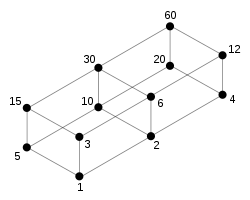Extravagant number
In number theory, an extravagant number (also known as a wasteful number) is a natural number in a given number base that has fewer digits than the number of digits in its prime factorization in the given number base (including exponents).[1] For example, in base 10, 4 = 2², 6 = 2×3, 8 = 2³, and 9 = 3² are extravagant numbers (sequence A046760 in the OEIS).
There are infinitely many extravagant numbers, no matter what base is used.[1]
Mathematical definition
Let be a number base, and let be the number of digits in a natural number for base . A natural number has the integer factorisation
and is an extravagant number in base if
where is the p-adic valuation of .
See also
Notes
- Darling, David J. (2004). The universal book of mathematics: from Abracadabra to Zeno's paradoxes. John Wiley & Sons. p. 102. ISBN 978-0-471-27047-8.
References
- R.G.E. Pinch (1998), Economical Numbers.
- Chris Caldwell, The Prime Glossary: extravagant number at The Prime Pages.
This article is issued from Wikipedia. The text is licensed under Creative Commons - Attribution - Sharealike. Additional terms may apply for the media files.
